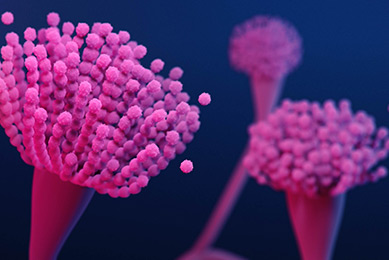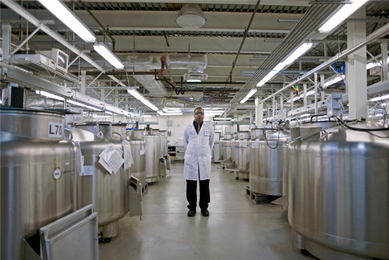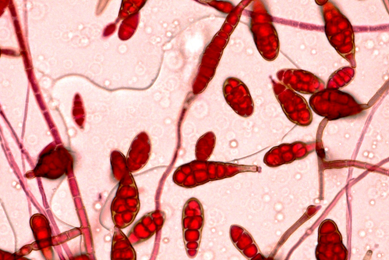Why it’s important
Invasive fungal diseases are an underrecognized, emerging global health threat that are estimated to affect millions of people worldwide.1-3 Limited access to quality diagnostics and therapeutics compounded by the rapid emergence of antifungal resistance has challenged the detection and treatment of these diseases.4 In response to this rising threat, WHO recently published the first-ever fungal priority pathogen list, which identifies 19 fungi with the greatest public health impact and emerging antifungal resistance risk.5 These pathogens were ranked and categorized into three priority groups (critical, high, and medium) based on criteria such as average case fatality, number of new cases annually, complications and sequelae, antifungal resistance, etc.5
- Critical: Cryptococcus neoformans, Candida auris, Aspergillus fumigatus, and Candida albicans
- High: Nakaseomyces glabrata (Candida glabrata), Histoplasma spp., Eumycetoma causative agents, Mucorales, Fusarium spp., Candida tropicalis, and Candida parapsilosis
- Medium: Scedosporium spp., Lomentospora prolificans (Scedosporium prolificans), Coccidioides spp., Pichia kudriavzeveii (Candida krusei), Cryptococcus gattii, Talaromyces marneffei, Pneumocystis jirovecii, and Paracoccidioides spp.
This report aims to bring more attention and resources toward developing policies and driving research efforts that are focused on strengthening the global response to these fungal pathogens, particularly regarding the prevention of antifungal resistance.
How we support this initiative
Having access to these priority pathogens is essential for researchers working toward tackling invasive fungal disease. As the leading developer and supplier of authenticated biological materials, ATCC provides the scientific community with access to an expansive collection of microbial strains needed to support the development of novel diagnostic tools and therapeutic options. Our diverse collection of fungi encompasses thousands of strains belonging to the 19 fungal species/group highlighted by WHO, of which more than 400 are clinical- or human-associated isolates (Figure 1). Investigators are also encouraged to visit BEI Resources, a NIAID-funded program managed by ATCC, which offers a catalog of fungi on the WHO fungal priority pathogens list to qualified researchers (Figure 2).
Figure 1. ATCC items on the WHO fungal priority pathogens list
Figure 2. BEI Resources items on the WHO fungal priority pathogens list
Did you know?
ATCC has nearly 30000 fungal products that represent an untapped potential.
Shahin Ali, PhD
Senior Scientist, Collections, ATCC
Dr. Ali is a Senior Scientist at ATCC with over 13 years of experience in the field of fungal biology and plant-pathogen interactions. Before joining ATCC, Dr. Ali worked for the USDA-ARS at Beltsville Agricultural Research Center, Maryland. He obtained his PhD from University College Dublin, Ireland.
Rebecca Bradford, MBA, MS, PMP
Senior Vice President, Government Programs, ATCC Federal Solutions (AFS)
Rebecca is responsible for the AFS business growth strategy, improved program management, and corporate responsiveness to the government and research community needs. Rebecca manages a portfolio of programs with NIAID, CDC, and BARDA that provide products and services to help the government address emerging infectious diseases, pandemic response and preparedness, medical countermeasures, and global health security.
Victoria Knight-Connoni, PhD
Head of Content Development and BioNexus Principal Scientist, ATCC
Dr. Knight-Connoni is a BioNexus Foundation Principal Scientist at ATCC where she is curates the catalog of products for use by the scientific community. Her team is responsible for sourcing new items to add to the collection and authenticating and characterizing the biological material. Dr. Knight-Connoni has spent her career in industrial microbiology working at several biotech companies focused on natural product discovery using microbes as the source of products. She has built and characterized microbial strain collections at multiple companies and led in vitro screening teams at Cubist and Indigo for product discovery. Dr. Knight-Connoni holds a doctorate in microbiology from the University of New Hampshire.
Explore our resources

Drug-resistant Fungi
ATCC provides authenticated fungal strains for the development, verification, and evaluation of novel antifungal drugs.
More
Fungal Cryopreservation
Ready-to-use microbial freeze media enable the rapid inoculation and preparation of cryopreserved cultures.
More Culture guide
Culture guide
Mycology Culture Guide
Get a detailed mycology guide on the growth, handling, propagation, preservation, and application of yeasts and filamentous fungi.
MoreReferences
- Brown GD, et al. Hidden Killers: Human Fungal Infections. Sci Transl Med 4(165): 165rv133, 2012. PubMed: 23253612
- Rodrigues ML, Nosanchuk JD. Fungal Diseases as Neglected Pathogens. A Wake-up Call to Public Health Officials. PLoS Negl Trop Dis 14(2): e0007964, 2020. PubMed: 32078635
- Global Action for Fungal Infections. Fungal Disease Frequency. Accessed online November 2, 2022 https://gaffi.org/why/fungal-disease-frequency
- Fisher MC, et al. Tackling the Emerging Threat of Antifungal Resistance to Human Health. Nature Reviews Microbiology 20: 57-572, 2022.
- World Health Organization. WHO Fungal Priority Pathogens List to Guide Research, Development and Public Health Action. Published October 25, 2022. Accessed online November 2, 2022 https://www.who.int/publications/i/item/9789240060241